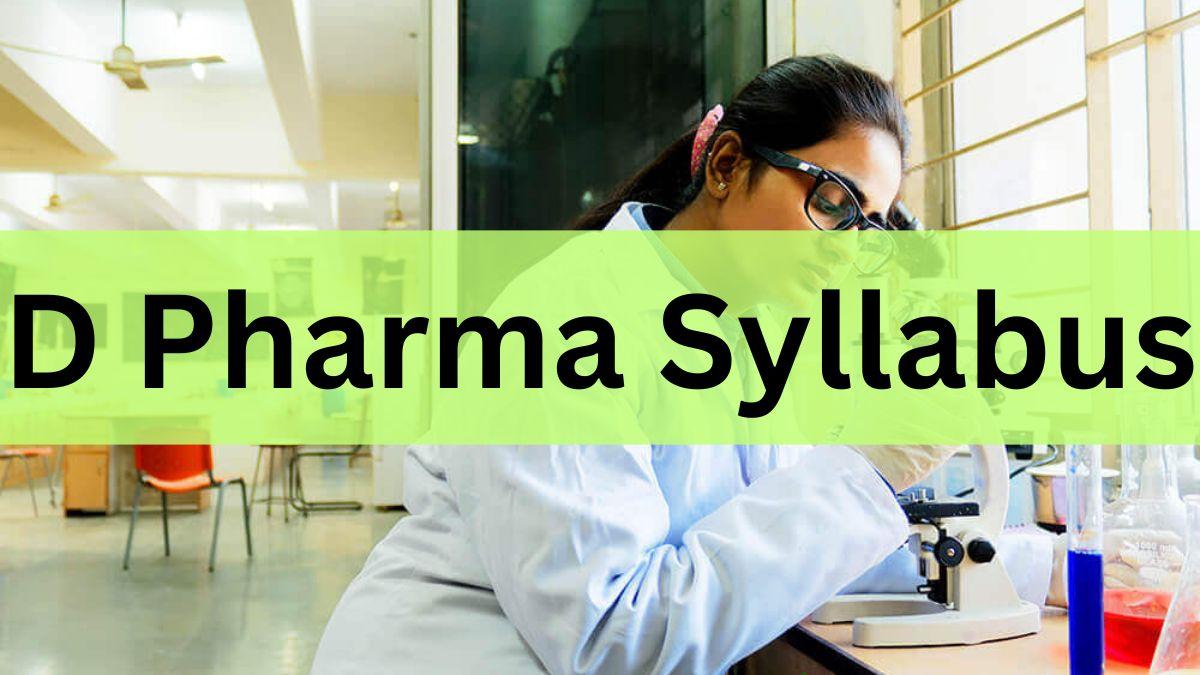Table of Contents
The D Pharmacy or D Pharma course is one of the most preferred course in the medical domain all over the world. The D Pharma course is known to produce the talented workforce in the pharma sector that is the backbone for maintaining a healthy society. The importance of qualified medical professionals in pharmacy field was recently felt during the COVID 19 pandemic. The D pharmacy course is one of the best way to become a talented professional in the pharmaceutical world. The D Pharma syllabus has been designed to impart quality education about drugs and excipients.
D Pharma Syllabus
D.Pharma is a course that lasts two years and focuses on studying the science and techniques of preparing and distributing medications. Students acquire fundamental pharmacy education which covers the utilization of chemistry in the pharmaceutical sector, as well as principles of biochemistry, pharmacology, and toxicology. The D Pharma syllabus consists of many key subjects like Biochemistry and clinical pathology, Pharmacognosy, Pharmaceutical Chemistry, Pharmacology & toxicology, etc. It is important to note that some subjects in D Pharmacy syllabus can vary from college to college.
D Pharmacy Syllabus 2025: Overview
Subjects covered in the D Pharmacy program consist of Pharmaceutics, Pharmaceutical Chemistry, Pharmacognosy, Biochemistry, etc. Leading companies that recruit graduates with a D.Pharma degree are Sun Pharmaceuticals Industries Limited, Reddy’s Laboratories, Intas Pharmaceuticals Limited, Mankind Pharma Limited, Wockhardt Limited, Aurobindo Pharma Limited, Cadila Healthcare Limited and others.
To be eligible for D.Pharma, students need to have completed 10+2 or an equivalent from a recognized board with at least 50% aggregate marks or an equivalent CGPA, with compulsory subjects being Physics, Chemistry, and Biology or Mathematics. Check the overview of the D Pharma course below.
| Parameters | Details |
| Course name | D Pharma or D Pharmacy |
| Full Name | Diploma in Pharmacy |
| Program Level | Diploma |
| Duration of the course | 2 years |
| Total Semesters | 4 Semesters |
| Popular Entrance Exams |
|
| Eligibility | 10+2 with PCM with minimum 50% marks (relaxation for reserved candidates) |
| Admission Process | Entrance Exam/Direct Admission Based |
| Average Annual Tuition Fees | INR 30,000 to INR 1.50 Lakh |
| Starting Annual Salary | INR 2 Lakh to INR 4.2 Lakh |
| Job Titles |
|
| Top Recruiters |
|
D Pharma Syllabus 2024 25 Subjects
The D Pharma syllabus generally consists of two types of subjects: core subjects and elective subjects. Students can check the core and elective subjects of D Pharmacy below along with their details.
Core Subjects in D Pharmacy
| Subject Name | Details |
| Pharmaceutics | In this subject, students will gain knowledge of the field of pharmacy. It also details the transformation of a new chemical entity or existing drug into a safe and effective medication for patient use.
Some topics from this subject’s syllabus are:
|
| Pharmaceutical Chemistry | The students will be educated on the overlapping areas of chemistry such as synthetic organic chemistry, pharmacology, and other biological disciplines. The point where they engage in designing, synthesizing chemicals, and creating bioactive molecules is called the intersection.
Some other parts of the subject’s syllabus include:
|
| Pharmacognosy | This subject will cover pharmacognosy, which is the study of medications and raw materials derived from natural sources. Plants, microbes, and animals are examples of natural resources. The topic also aids in comprehending the examination of biological, chemical, biochemical, and physical characteristics of substances.
Some other parts from the syllabus of this subject are:
|
| Biochemistry and clinical pathology | The students will be taught the entire idea of molecular levels within the chemical processes linked to living cells. The aim of this subject is to offer the biochemical knowledge and principles necessary for comprehending metabolism in both pathological and physiological states.
Some other topics of this subject’s syllabus includes:
|
| Human anatomy and physiology | Understanding the structure and description of the human body is facilitated by the subject. Human anatomy describes the organization of the body, while physiology studies the body’s functions at various levels.
Some other topics from this subject’s syllabus includes:
|
D Pharma Elective Subjects
| Subject Name | Details |
| Pharmacology & toxicology | In this subject, the student will gain knowledge of both pharmacology and toxicology. Pharmacology focuses on the medicinal properties of chemicals, specifically pharmaceuticals. Toxicology is the field that focuses on the negative impacts of chemicals and evaluates the safety of medications. Students will explore pharmacology’s breadth, different drug administration routes, drug absorption, and the factors that influence it within this subject. |
| Pharmaceutical jurisprudence | In this topic, students will be taught about the guidelines and protocols of pharmacy, as well as pharmacy practice, drugs, and pharmaceuticals. The primary goal of this subject is to strengthen and update the regulations concerning narcotic drugs and psychotropic substances. The legal term for this topic is a manual that lawyers and judges use to understand specific laws that need to be correctly interpreted. |
| Health Education and community pharmacy | Knowledge about health education, which aims to preserve and enhance health, is provided by the subject. It is implied that a community pharmacy is a location where pharmacists oversee pharmacy practice directly. |
| Drug store and business management | The subject is a recent addition to pharmacy studies established by the Pharmacy Council of India and focuses on the circulation of products and services from the industry. The fundamental idea of this subject is to transport goods and individuals between different locations. Through this course, students will be taught the fundamental concepts of inventory management. |
D Pharmacy Syllabus 1st year 2024
Check the D Pharma syllabus for 1st year, i.e., 1st and 2nd semester, in the table below.
| Semester 1st | Semester 2nd |
| Biochemistry and Clinical Pathology | Hospital and Clinical Pharmacy |
| Human Anatomy and Physiology- I | Pharmaceutical Chemistry- I |
| Health Education and Community Pharmacy- I | Pharmacology & Toxicology |
| Pharmacognosy – I | Pharmaceutics Lab |
| Pharmacognosy Lab | Drug Store and Business Management |
| Pharmaceutical Chemistry-I Lab | Pharmaceutical Chemistry-II Lab |
D Pharmacy Syllabus 2nd Year 2024-25
The D Pharmacy syllabus for 2nd year or 3rd and 4th semester has been tabulated herein.
| 3rd Semester | 4th Semester |
| Health Education and Community Pharmacy | Health Education and Community Pharmacy- II |
| Human Anatomy and Physiology – II | Pharmaceutical Jurisprudence |
| Biochemistry and Clinical Pathology Lab | Hospital and Clinical Pharmacy Lab |
| Antibiotics | Pharmaceutical Chemistry-II |
| Pharmacognosy- II | Pharmaceutics |
D Pharma Detailed Syllabus 2025
Students can check the detailed syllabus for the D Pharmacy course below.
| Subject Name | Overview of the Subject |
| Pharmaceutics I and II | Students will be educated on preformulation studies of drug substances, proteins, and peptides, complexation of metal and organic molecular complexes, solubilization of nonelectrolytes, and statistical methods and factorial design optimization. The students will also grasp solid-state pharmaceutics at the molecular, particle, and bulk scales. |
| Biopharmaceutics and pharmacokinetics | The students will be educated on biopharmaceutics, a significant area within pharmaceutical sciences that involves studying the physical and chemical characteristics of a drug in its dosage form and examining the effects on patients after it is given. The students will learn that the fundamental concept of pharmacokinetics in this subject is the drug’s plasma concentration. |
| Pharmaceutical Chemistry | There are two main types of pharmaceutical chemistry: organic chemistry and medicinal chemistry. Students will gain an understanding of how to design and synthesize biologically active molecules. The objective of this subject is to help students create novel chemical compounds, facilitate the identification of new medications, and broaden the range of available chemical treatments. |
| Pharmaceutical analysis | The students will comprehend pharmaceutical analysis, which is the study of drugs using analytical chemistry, including both bulk drug analysis and pharmaceutical products. The students must focus on the methods and techniques needed to identify the composition of different chemical compounds utilized in the pharmaceutical sector. |
| Pharmacognosy | The students will be taught about the production of medications or raw drugs using natural sources like plants, microbes, and animals. Pharmacognosy involves examining natural resources and their biological, biochemical, and physical properties. The students will also comprehend the methods used for extracting and isolating it. |
| Research Methodology | The students will grasp the research methodology, which refers to the particular steps and methods employed to gather, sort, choose, and interpret data related to the specific subject. In this subject paper, students will analyze the overall reliability and validity of the subject matter. |
D Pharmacy Syllabus 1st and 2nd Year PDF 2024-25
Detailed PDF for d pharmacy syllabus 1st and 2nd year 2024-25 is given below:





 CUET Physics Syllabus 2025 PDF Download ...
CUET Physics Syllabus 2025 PDF Download ...
 CUET Syllabus 2025 for Commerce Students...
CUET Syllabus 2025 for Commerce Students...
 CUET Arts Syllabus 2025 Out: Check CUET ...
CUET Arts Syllabus 2025 Out: Check CUET ...










